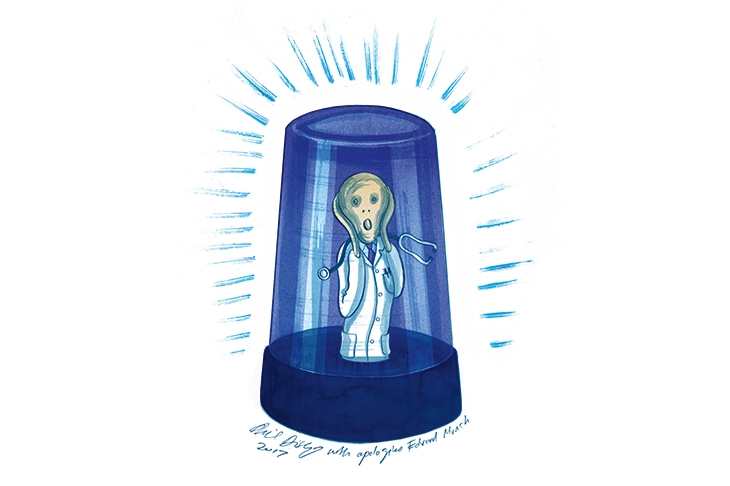The concept of mental health is a charter for hypochondriacs, narcissists, con artists and social fraudsters: for who can prove that someone does not feel depressed, anxious or distressed to the point of being unable to work? Who can distinguish between “can’t,” “won’t,” and “wouldn’t prefer”?
Unfortunately, mental health has become synonymous with any deviation from a state of perfect equanimity and contentment.
Fragile mental health, and especially mental health problemswould prevent a large number of young people from working, with British people in their early twenties now more likely as a result, more people are unemployed than people in their early 40s. Today we even hear people say: “I have good mental health”, which does not mean something positive but something negative. Mental health means something bad, something debilitating.
Those who have mental health problems, or simply Mental Health, can get by economically without working. This, I suppose, is a powerful cause of considerable psychological discomfort, because even today most people do not like to feel useless in the eyes of others. The fraudsters among them, of course, are happy to get paid for doing nothing, especially if they can supplement their income on the side.
But the difference between genuine cases and fraudulent cases, as genuine cases TO DO experiencing misery of one sort or another is not absolutely categorical. After all, if you play a role long enough, that’s what you become: habit changes character.
What is mental health? The only definition I can think of is the absence of outright insanity. Unfortunately, this now means any deviation from a state of perfect equanimity and contentment. A long time ago, I noticed that the word “unhappy” had disappeared from the everyday lexicon, in favor of the word “depressed”. For every person who claims to be unhappy, there are thousands who say they are depressed, regardless of the conditions that make them that way. When I told depressed women that there would be something wrong with them if they were happy while their disgusting boyfriends pulled them by the hair and slammed their heads against the floor, they laughed, as if they knew all along that complaining of depression in such circumstances was absurd.
But the semantic transition from unhappiness to depression, in many cases absurd and even laughable, is not without deleterious effects. If you are unhappy, you look for the causes and, if you have what used to be called inner resources, you confront them. (Unfortunately, there are some truly tragic circumstances in which this is not possible.) But if you pretend to be depressed, you are shifting the responsibility to professionals who are supposed to do something for you that will eliminate depression as such . the diseased appendix is removed.
This is stupid and explains why the expansion of so-called mental health services will always feel like an animal chasing its own tail. Supply creates its own demand. The psychiatrist Colin Brewer formulated a quasi-law: misery increases with the means available to relieve it.
I calculated once that if you go through the Diagnostic and Statistical Manual of the American Psychiatric Association, 5th editing (which British judges believe with all the fervor of a Latin American peasant praying to a miraculous Virgin for the healing of his pig), one could conclude that the average citizen of the Western world suffered from two and a half mental disorders per year. .
Of course, there are fads when it comes to diagnosis. A generation ago, he was a multiple personality — The three faces of Eve that sort of thing – and the DSM-5 suggested that the prevalence might be as high as 1.5 percent of the adult population, or one in sixty-six people. Multiple personalities have since become very rare.
Today, gender dysphoria is in fashion, along with children’s gender identity. references increasing from 210 per year in 2011 to 5,000 per year in 2021. Either there must be something new in the water supply or we are dealing with a socio-psychological epidemic.
I do not deny that true insanity exists or that physical illness can present with psychological symptomatology straight out of the DSM-5. The psychiatrist and the ordinary doctor must be aware of this. But this overlap does not explain the sharp increase in diagnoses of psychiatric disorders among young people. I also don’t deny that there are many reasons why young people are dissatisfied or anxious about the future, from the instability of family life to the uncertainty of economic prospects. But no army of nurses, psychologists, therapists or doctors will improve things: on the contrary, it will dig a hole from which it will be difficult for young people to escape.
The ever-expanding range of psychiatric diagnoses encourages the belief that any deviation from a desired state of mind is a medical condition amenable to treatment by a medical or technical solution. The result is a propensity for mental hypochondria, with people taking their mental temperature, so to speak, like hypochondriacs take their blood pressure. But this excludes honesty or true reflection and leads to the search for false cures for false diseases. The corollary is the neglect of those who truly need care, who drown in an ocean of exaggerated needs.
There are ways to improve the situation. The first is the complete abandonment of the concept of mental health. The second is the abandonment of the automatic legal equivalence between psychiatric disorder and physical illness.
This article was originally published on The spectatorThe UK’s website.
